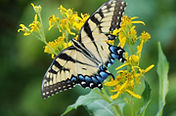Carrot (Family Apiaceae)
The Apiaceae (or Umbelliferae) is a family of usually aromatic plants
with hollow stems, commonly known as umbellifers. It includes angelica,
anise, arracacha, asafoetida, caraway, carrot, celery, centella asiatica,
chervil, cicely, coriander/cilantro, cumin, dill, fennel, hemlock, lovage,
Queen Anne's lace, parsley, parsnip, sea holly, the now extinct silphium,
and other relatives. It is a large family with about 300 genera and more
than 3,000 species. The earlier name Umbelliferae derives from the
inflorescence being generally in the form of a compound "umbel", and
has the same root as the word "umbrella".
This family, mostly herbs, can be found in northern temperate regions
and in tropical highlands located throughout the world.
Many members of this plant group are cultivated, for various purposes.
The plant structure includes a tap root, which can be large enough to be
useful in food, for example parsnips, carrots, and Hamburg parsley.
Plants of this category also are adapted to conditions that encourage
heavy concentrations of essential oils, so that some are used as flavorful
or aromatic herbs, such as parsley, cilantro, and dill. The plentiful seeds
of the umbers, likewise, are sometimes used in cuisine, as with coriander,
fennel, cumin, and caraway. Almost every widely cultivated plant of this
group is a companion plant. In large part, this is because the tiny flowers
forming the umbels, for which the group is named, are perfectly suited for
ladybugs, parasitic wasps, and predatory flies, which actually drink nectar
when not reproducing. They then will prey upon insect pests on nearby
plants.
Park Activities
Calendar of Events
Volunteer Programs
Sky Meadows Park
Location
Geography
Habitats
Trails
Visiting Park
Crooked Run Valley
Special Projects

